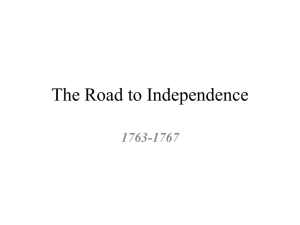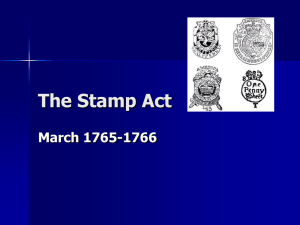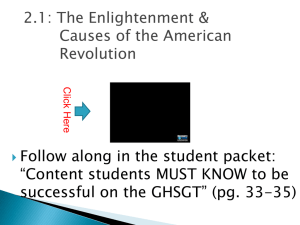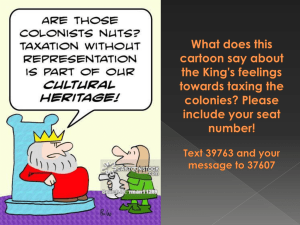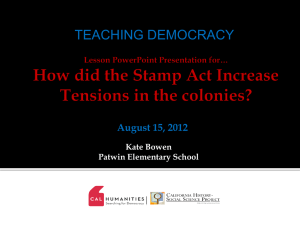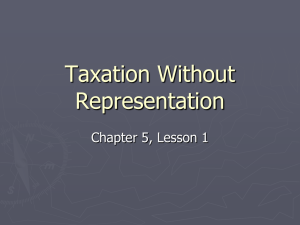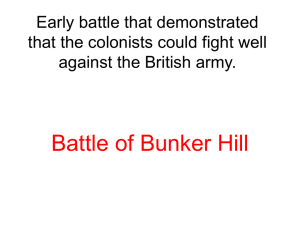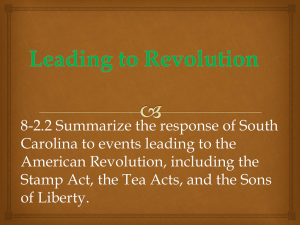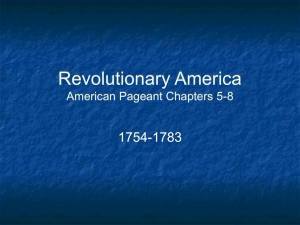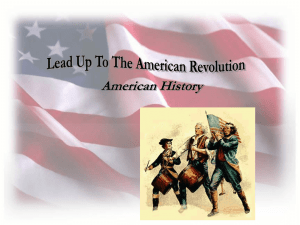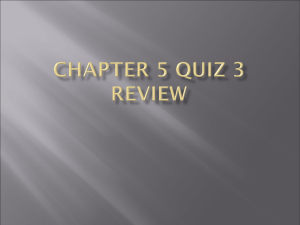ch5s1
advertisement
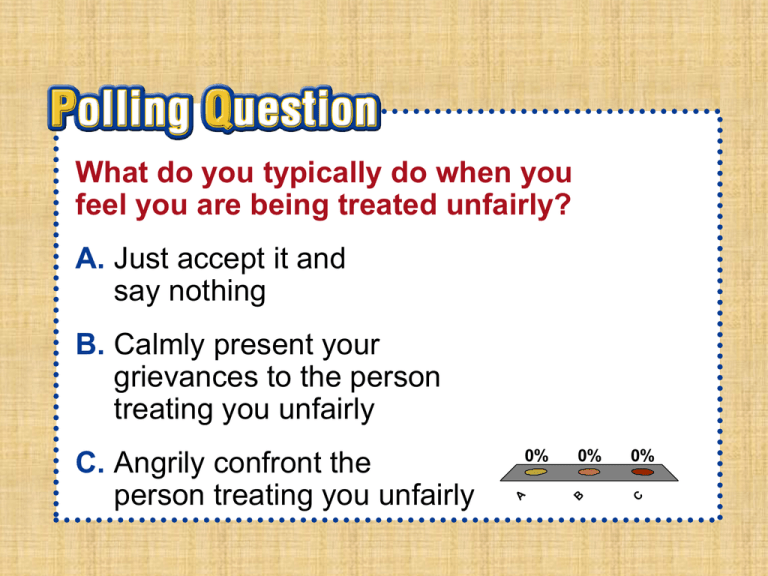
What do you typically do when you feel you are being treated unfairly? A. Just accept it and say nothing B A C. Angrily confront the person treating you unfairly A. A B. B 0% C. 0% C 0% C B. Calmly present your grievances to the person treating you unfairly Chapter 5 The Spirit of Independence (1763-1776) Section 1 Taxation Without Representation Chapter Time Line Chapter Time Line Following the French and Indian War, how did the British government anger the American colonists? Proclamation of 1763 • Britain gained a vast territory after the French and Indian War • The Proclamation of 1763 prohibited colonists to move west of the Appalachian Mountains • Britain did this to protect its citizens from Native American attacks • Also the Proclamation kept settlers near the coast where there would be more trade of British goods • The Proclamation also allowed Britain to control the fur trade on the frontier Britain’s Interests • Britain planned on stationing 10,000 troops in the colonies to protect these interests (Quartering Act) • Britain needed new revenue (incoming money) to pay troop expenses • Also the French and Indian War left Britain with a huge debt • The king and Parliament believed the colonists should pay for part of the cost • New taxes on the colonies were introduced along with enforcing existing taxes more strictly Britain’s Trade Law • 1763- Britain decided to act against smuggling • Smuggling lost Britain revenue • American juries often found smugglers innocent • The prime minister of Britain (George Grenville) convinced Parliament to pass a law allowing smugglers to have a trial by British officers • 1767- Parliament authorized writs of assistance • Allowed customs officials to enter any location to search for smuggled goods The Sugar Act (1764) • Lowered the tax on imported molasses • Prime Minister Grenville hoped the lower tax would convince the colonists to pay the tax instead of smuggling • The act also let officers seize goods from smugglers without going to court • Colonists felt these actions violated their rights as English citizens What was the purpose of the Sugar Act? A. To raise taxes on imported molasses B. To lower taxes on imported molasses C. To prohibit trade with countries that sold sugar D. To encourage trade with countries that sold sugar 0% A A. B. C. 0% D. B A B C 0% D C 0% D The Stamp Act (1765) • Tax on almost all printed materials • Newspapers, wills, and playing cards • All printed materials had to have a stamp • British officials applied the stamp after the tax was paid • Opposition to the Stamp Act centered on two points – 1. Parliament had interfered in colonial affairs by taxing the colonies directly – 2. It taxed colonists without their consent Protesting the Stamp Act • Patrick Henry, a member of Virginia’s House of Burgesses, persuaded the Burgesses to take action against the Stamp Act • The Virginia assembly passed a resolution (a formal expression of opinion) • Declared that Virginia’s assembly had “the only and sole exclusive right and power to lay taxes” on it citizens Protesting the Stamp Act in Boston • Samuel Adams started the Sons of Liberty • People in other cities also organize the Sons of Liberty groups • Protesters burned effigies (rag figures) • Effigies represented tax collectors • Protestors also destroyed houses belonging to royal officials Stamp Act Congress • In October 1765 • Nine colonies sent delegates to New York • Drafted a petition to the king and Parliament • Declared that the colonist could only be taxed by their own assemblies More Protests Against The Stamp Act • People refused to use the stamps • Urged merchants to boycott (refuse to buy) British and European goods • Thousands of merchants signed nonimportation agreements • British merchants lost business and begged Parliament to repeal the Stamp Act • March 1766- Stamp Act was repealed • The same day Parliament passed the Declaratory Act • Declaratory Act- Said the Parliament had the right to tax and make decisions for the British colonies “in all cases” Which law stated that Parliament had the right to tax and make decisions for the British colonies “in all cases”? A. Proclamation of 1763 B. Stamp Act C. Declaratory Act D. Townshend Acts 0% A A. B. C. 0% D. B A B C 0% D C 0% D The Townshend Acts (1767) • British leaders knew that colonists would resist internal taxes • Charles Townshend had an idea to tax the colonists “without offense” • Townshend Acts put a tax on imported goods such as glass, tea, and paper • Tax was paid at the port of entry • By this time, any British taxes angered the colonists Protesting the Townshend Acts • Colonists felt that only their own representatives had the right to tax them • The colonists organized another boycott • Women formed groups (Daughters of Liberty) • These women urged Americans to wear homemade fabrics • Also to produce other goods they needed rather than buy British goods Following the French and Indian War, how did the British government anger the American colonists? -Parliament believed the colonists should pay for some of Britain’s War debt. Parliament issued the Sugar Act, Stamp Act, and Townshend Acts, which increased the colonists’ anger. They issued boycotts and non importation agreements. Chapter 5 Section 1 Quiz Writs of assistance enabled British customs officers to search 1. foreigners. 2. foreign goods. 3. people for contraband. 4. homes for smuggled goods. m ug m es ho gl e. .. an d. on tr ab fo rc le op pe fo rs od s go re ig n fo fo re ig n er s . . 25% 25% 25% 25% The colonists paid lower taxes on molasses because of the 1. Sugar Act. 2. Stamp Act. 3. Proclamation of 1763. 4. writ of assistance. ce . . of rit w Pr oc la m at io as n si s of ta n 17 63 Ac t p St am Su ga rA ct . . 25% 25% 25% 25% Which act taxed colonists without their consent? Townshend Acts Sugar Act Stamp Act Declaratory Act or y Ac t D ec la ra t St am p ct Su ga rA Ac ts nd he w ns Ac t 25% 25% 25% 25% To 1. 2. 3. 4. Goods being imported to the colonies were taxed by the Stamp Act. Declaratory Act. Sugar Act. Townshend Acts. Ac ts . ct . rA nd ga he w ns To la ra t ec D Su p or y Ac t Ac t . . 25% 25% 25% 25% St am 1. 2. 3. 4. Which act stated that Parliament did have the right to tax colonists? Stamp Act Townshend Acts Declaratory Act Sugar Act Su ga rA ct Ac t or y ec D To w ns he la ra t nd p Ac ts Ac t 25% 25% 25% 25% St am 1. 2. 3. 4. Participant Scores 0 0 Participant 1 Participant 2 0 0 0 Participant 3 Participant 4 Participant 5 Racing Leader Board
